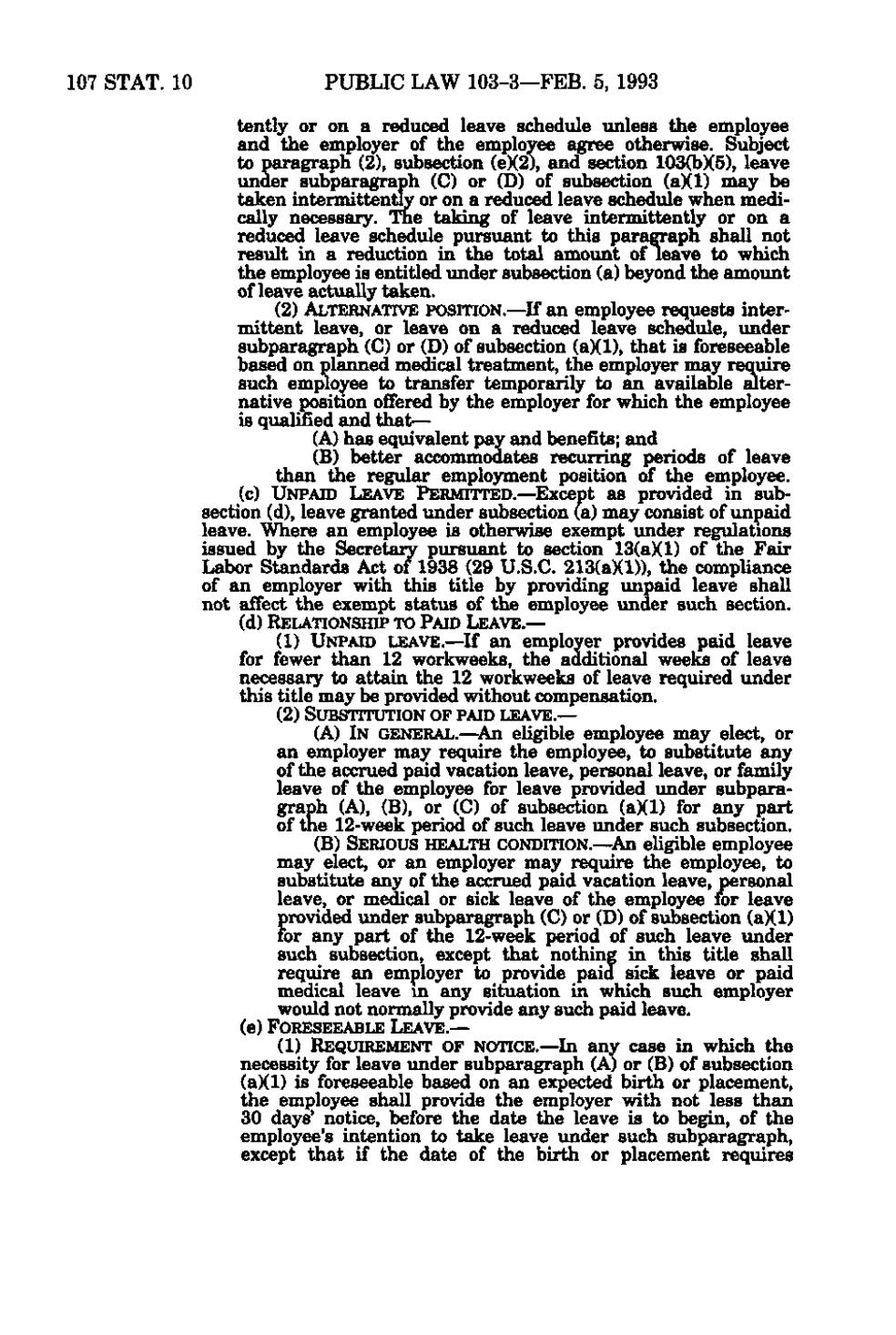107 STAT. 10 PUBLIC LAW 103-3 —FEB. 5, 1993 tently or on a reduced leave schedule unless the employee and the employer of the employee agree otherwise. Subject to paragraph (2), subsection (e)(2), and section 103(b)(5), leave under subparagraph (C) or (D) of subsection (a)(1) may be taken intermittently or on a reduced leave schedule when medically necessary. The taking of leave intermittently or on a reduced leave schedule pursuant to this paragraph shall not result in a reduction in the total amount of leave to which the employee is entitled under subsection (a) beyond the amount of leave actually taken. (2) ALTERNATIVE POSITION.— If an employee requests intermittent leave, or leave on a reduced leave schedule, under subparagraph (C) or (D) of subsection (a)(D, that is foreseeable based on planned medical treatment, the employer may require such employee to transfer temporarily to an available alternative position offered by the employer for which the employee is qualified and that— (A) has equivalent pay and benefits; and (B) better accommodates recurring periods of leave than the regular employment position of the employee. (c) UNPAID LEAVE PERMITTED. —Except as provided in subsection (d), leave granted under subsection (a) may consist of unpaid leave. Where an employee is otherwise exempt under regulations issued by the Secretary pursuant to section 13(a)(l) of the Fair Labor Standards Act of 1938 (29 U.S.C. 213(a)(l)), the compliance of an employer with this title by providing unpaid leave shall not affect the exempt status of the employee under such section. (d) RELATIONSHIP TO PAID LEAVE.— (1) UNPAID LEAVE.—If an employer provides paid leave for fewer than 12 workweeks, the additional weeks of leave necessary to attain the 12 workweeks of leave required under this title may be provided without compensation. (2) SUBSTITUTION OF PAID LEAVE.— (A) IN GENERAL. —An eligible employee may elect, or an employer may require the employee, to substitute any of the accrued paid vacation leave, personal leave, or family leave of the employee for leave provided under subparagraph (A), (B), or (C) of subsection (a)(1) for any part of the 12-week period of such leave under such subsection. (B) SERIOUS HEALTH CONDITION.— An eligible employee may elect, or an employer may require the employee, to substitute any of the accrued paid vacation leave, personal leave, or medical or sick leave of the employee for leave provided under subparagraph (C) or (D) of subsection (a)(D for any part of the 12-week period of such leave under such subsection, except that nothing in this title shall require an employer to provide paid sick leave or paid medical leave in any situation in which such employer would not normally provide any such paid leave. (e) FORESEEABLE LEAVE. — (1) REQUIREMENT OF NOTICE.— In any case in which the necessity for leave under subparagraph (A) or (B) of subsection (a)(1) is foreseeable based on an expected birth or placement, the employee shall provide the employer with not less than 30 days' notice, before the date the leave is to begin, of the employee's intention to take leave under such subparagraph, •^ except that if the date of the birth or placement requires
�
